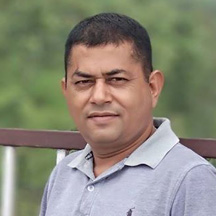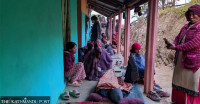National
Unverified information shared on social media puts a foreign returnee in a fix
"I know the authorities are being extra cautious but my name and address were made public on social media. This alone was stressing me out.”%20(1).jpg&w=900&height=601)
Dilliram Khatiwada
Bidyanand Chaudhary of Belaka Municipality in Udaypur district, who had recently returned from Qatar, received a phone call early on Tuesday morning from an unknown caller who identified himself as an employee of the municipality. The caller asked Chaudhary to immediately come to the municipal office for a medical examination.
As Chaudhary was heading towards the office at around 8am, one of the officials met him half-way and said that he didn't need to visit the office and suggested that he return to his house.
At around 4:30 in the evening, a van from the Rampur Area Police arrived outside his house, followed by an ambulance. "I had no clue as to what was happening," said Chaudhary. "By the time the police and ambulance had arrived there was a big crowd outside my house."
Chaudhary, accompanied by his wife, was then taken to the Dharan-based BP Koirala Institute of Health Sciences. He stayed at the hospital for around 24 hours and was discharged on Wednesday.
Chaudhary had to go through the ordeal because of a Facebook post by Durga Kumar Thapa, mayor of Belaka Municipality. Thapa, without verifying the facts, had posted that Chaudhary was one of the passengers on the same Qatar Airways flight (call sign QR 650) as the 19-year-old student who tested positive for Covid-19.
The information provided by the mayor was incorrect as the female student had arrived in Kathmandu by Qatar Airways flight QR 652 on March 17 while Chaudhary had arrived on a different flight on March 18. Thapa had even passed the unverified information to Chief District Officer Dipak Kumar Pahadi and the personal secretary of the chief minister of Province 1.
Thapa's factually incorrect social media post spread like a wildfire as local journalists also attributed Thapa's incorrect post and shared the information online while a sense of fear gripped the locals and Chaudhary's neighbours upon seeing the post.
"These people have unnecessarily harassed me and I was brought to the hospital only because of the rumours," said Chaudhary, "I know the authorities are being extra cautious but my name and address were made public on social media. This alone was stressing me out.”
Dr Mita Rana, a clinical psychologist, says inconsiderate use of information in making someone a victim induces doubts and confusion in the said individual. "This can lead to fear and anxiety disorder as the person becomes traumatised with all the negative attention he gets at a time like this," said Rana.
Chaudhary's brother, who looks after the family's cattle, said that since the rumours on social media caught fire, many known and unknown people have been asking about his brother's whereabouts. "Earlier on Tuesday, a man wearing a mask and a helmet stopped me on my way and asked which places my brother had visited upon returning from Qatar," he said.
Thapa, after learning that his post was factually incorrect, removed it and posted a new status. However, the screengrab of the original post is still making rounds on various social media platforms.
Rana further pointed out that those who have access to information regarding these matters must be responsible while disseminating information. “During these times, everyone must be sensitive and take ethical decisions. They must make sure not to victimise the individual,” said Rana, “Further victimising an individual who is already in acute stress can lead to long-term physical and psychological problems.”




 10.73°C Kathmandu
10.73°C Kathmandu












